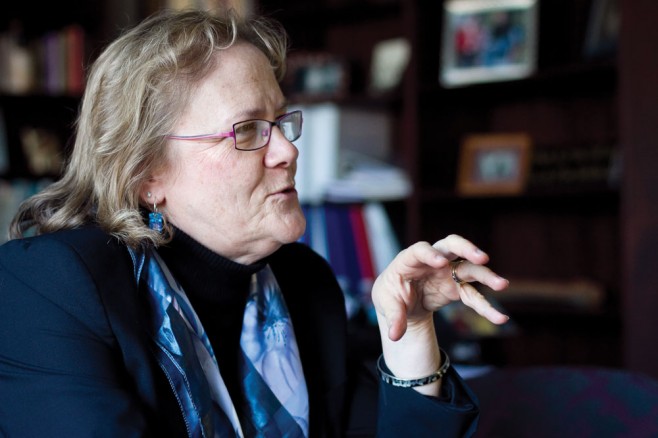
Joan Kenerson King ’79
One of the healthiest things we can do is simply listen to someone’s story and tell our own, says Joan Kenerson King.
People with mental health issues need to have a chance to express their hopes and dreams for the future, King told Crossroads. “They have the same hurts, longings and dreams as anyone, but have more challenges in how to get to where they want to be.”
The behavioral health system needs to listen to the people it serves, said King, who spent the first five years of her nursing career as a surgical intensive care unit nurse. But her heart led her to visiting homes in North Philadelphia as a community health nurse, which stimulated her interest in the mind and in the role families and communities play in health. In 1990 she completed a master’s degree in psychiatric nursing.
She was the founding director of a psychiatric home care program, which closed after seven years when Medicare funding dried up. The paucity of funding for assistance to impoverished people troubles her greatly. “I’m convinced that half of what we see has nothing to do with a brain disorder, and everything to do with the economic pressures on people. The dance between serious mental illness, addiction, and poverty is an intimate one.”
King has been a full-time consultant for the past 15 years, offering training in the power and techniques of storytelling “to bear witness to another’s joy and pain” and help that person change. King lives by the mantra that “your life can be better tomorrow than it is today.” She has worked with more than 1,000 people on helping them to tell their stories about their resilience, strength and hope, despite the challenges they face in regard to addiction, mental illness, socio-economic deprivation, or a combination of these.
In February 2012 she joined the staff of the National Council for Community Behavioral Healthcare Organizations, as a senior integration consultant. She is helping states and local behavioral health systems prepare for healthcare reform and develop partnerships and systems to integrate physical and behavioral healthcare.
King recalls that her first experience in listening carefully came in her final year as a nursing student at EMU, when she was assigned to pay a weekly visit to a person with a serious mental illness. “I still remember sitting at that woman’s kitchen table and listening to her story. It was part of the ethos of EMU—respecting people’s stories.”
For more on King’s work, visit her website at http://joankkingconsulting.com.
— BPL